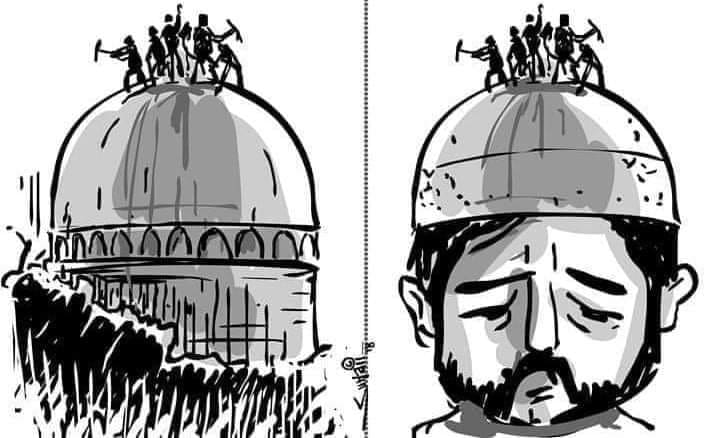
In the broad daylight of the 6th of December, 1992, a deranged and frenzied mob of men wearing saffron-coloured bands on their heads and waists razed the 16th-century-built Babri Masjid to the ground. Nearly 150,000 kar sevaks, chanting repugnant communal slogans, armed with shovels, pick axes, iron rods and mallets, broke into the protected mosque after storming into a cordon of police. Within minutes, the mosque was reduced to rubble as the right-wing politicians that led the movement relished the scene.
The demolition was then celebrated with the distribution of sweets at the site as a six-year long campaign of the Bharatiya Janata Party (BJP) to destroy the mosque and replace it with a temple finally was seen to have started to bear fruits.
This incident, one of gravest set-backs to the secular ethos of the land, left a pervasive insecurity in the hearts of millions of Muslims in the country as they witnessed their own mosque being brought down right in front of their eyes. For them, it was not just the mosque that was razed but also their belief and hope in the state to provide them security and dependability that was demolished. The episode and its eventualities estranged them and led some to believe that their own land and people had been disloyal to them.
Today, it has been 29 years since the demolition of the Babri Masjid, but the unfortunate reality is that India still finds itself clutched into the same, if not increased, communal frenzy. Each day has become an extension of the day of the Babri demolition with the feelings and beliefs of either side just the same as they were when the incident took place.
Even today, it is not difficult to find someone who has the same malice in his heart for the Muslim community as a kar sevak then had. Nor is it difficult to find a bearded Muslim man who is afraid of getting lynched everyday he goes to work just as a Muslim who stepped out of his house that day was. It is as easy for Muslims to be picked, framed in terror cases and be incarcerated for a crime they never committed. The anti-Muslim Hindutva politics in the country has yet again successfully managed to build a discourse against Muslims which has nearly normalised hate crimes against them. The same feeling of helplessness lingers among them, with justice being as utopian as it was on that day. To them, protection is just another far-fetched conception. In fact, even today, the state provides them the exact protection that it claimed to have provided to their historical mosque.
The anti-Muslim hate in the hearts of people is as fresh, thanks to the religiously-sectarian political rhetoric and propaganda of right-wing leaders. It so seems that the demolition only paved the way for other such events to take place. The burning of mosques and the vandalism in Muslim localities in the north-eastern state of Tripura by right-wing activists are acts which assure that the loathe has not yet gone stale. The lynchings of scores of Muslim men on the streets of metropolitan cities is another testament to this fact. The desecration of an Islamic shrine and its books and contents being set on fire in Haryana is another incident that reveals the resurfacing of the anti-Muslim bigotry of 1992. Even the slogans of right-wing politicians and vigilantes are as communal and heinous as they were when the incident happened 29 years ago. Also, the current BJP government’s promise of Sabka Saath Sabka Vikas is as empty as Kalyan Singh’s promise to protect the Babri Masjid.
Muslims in India receive no fair treatment by government and law-making agencies. Each day is a struggle for a dignified existence in a so-called civilised society with laws formulated with an intent of making life harder for them. Every other day is an attempt to work doubly hard so that one does not attract any suspicion or negative attention. Each day is an effort to avoid being detained with the charges of UAPA, being arrested under the “love-jihad” law or locked up for violating the cow-protection laws.
Everyday marks a struggle for justice in a country with a faltering judicial system. It is as if each day has become the 6th of December, full of hopelessness, fear, torment, pain and suffering on one hand and of hatred, animosity, prejudice, might and force on the other. It is only that the kar sevaks have been replaced with Hindutva vigilantes actively working in almost every locality of our cities. Besides, the politicians sitting on the Rath have switched with those holding political offices in the government. Also, Muslims no longer need riots to be killed. Other than that, all of the rest is just the same.
It is this same emotion that veteran Urdu poet Rahat Indori felt when he wrote –
Toot rahi hai mujh mein har din ek masjid
Iss basti mein roz disambar aata hai
(Each day, a mosque in me is tearing down
December comes to my ghetto everyday).
Madeeha Fatima is a Class 12 student studying at Aligarh Muslim University, and is an aspiring journalist.



